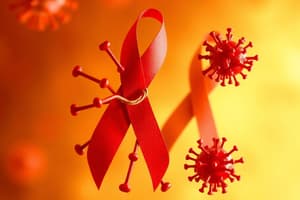Podcast
Questions and Answers
What are the two classes of immuno-deficiency states?
What are the two classes of immuno-deficiency states?
- Congenital and acquired
- Primary and secondary (correct)
- Inherited and acquired
- Acute and chronic
Which type of immuno-deficiency state is more common?
Which type of immuno-deficiency state is more common?
- It depends on the age of the patient
- Secondary (correct)
- Primary
- Both are equally common
What is the cause of AIDS?
What is the cause of AIDS?
- A viral disease caused by HIV (correct)
- A genetic disorder
- A fungal infection
- A bacterial infection
What is AIDS?
What is AIDS?
What are the major routes of HIV transmission?
What are the major routes of HIV transmission?
What is the most common route of HIV transmission?
What is the most common route of HIV transmission?
What are the groups at risk of developing AIDS?
What are the groups at risk of developing AIDS?
Which groups are at risk of developing AIDS?
Which groups are at risk of developing AIDS?
What is the CD4 molecule's role in HIV infection?
What is the CD4 molecule's role in HIV infection?
What is the major receptor for HIV?
What is the major receptor for HIV?
What are the clinical phases of HIV infection?
What are the clinical phases of HIV infection?
What are the clinical phases of HIV infection?
What are the clinical phases of HIV infection?
What are some examples of opportunistic infections that patients with AIDS may develop?
What are some examples of opportunistic infections that patients with AIDS may develop?
What are some of the opportunistic infections commonly seen in AIDS patients?
What are some of the opportunistic infections commonly seen in AIDS patients?
What is AIDS-dementia complex?
What is AIDS-dementia complex?
What is AIDS-dementia complex?
What is AIDS-dementia complex?
What is the worldwide prevalence of HIV infection?
What is the worldwide prevalence of HIV infection?
What is the most effective defense in the fight against AIDS?
What is the most effective defense in the fight against AIDS?
What is the percentage of patients with clinically evident neurologic dysfunction?
What is the percentage of patients with clinically evident neurologic dysfunction?
What are the two main types of HIV?
What are the two main types of HIV?
What is the origin of HIV?
What is the origin of HIV?
Why is vaccine development for AIDS difficult?
Why is vaccine development for AIDS difficult?
Is HIV infection transmitted by usual personal contact?
Is HIV infection transmitted by usual personal contact?
Why is vaccine development for AIDS difficult?
Why is vaccine development for AIDS difficult?
Flashcards are hidden until you start studying
Study Notes
Overview of Immuno-Deficiency States and AIDS
- There are two classes of immuno-deficiency states: primary (present at birth, usually due to a genetic disorder) and secondary (much more common and can be caused by various factors, such as old age, chronic malnutrition, widespread malignancy, diseases, drug therapy, and AIDS).
- Examples of primary immunodeficiency states include X-linked agammaglobulinemia, isolated IgA-deficiency, severe combined immune deficiency, and acquired immunodeficiency syndrome (AIDS).
- AIDS is a retroviral disease caused by human immunodeficiency virus (HIV) and is characterized by severe immune suppression leading to opportunistic infections, secondary neoplasms, and neurological manifestations.
- Worldwide, over 35 million people are infected with HIV, most of them in Africa. The virus has originated in Western Africa, and there are two main types of HIV, HIV-1 and HIV-2.
- The major routes of HIV transmission are sexual contact, parenteral inoculation (e.g., dirty needles), and vertical transmission (from infected mothers to their newborns).
- Groups at risk of developing AIDS include homosexual or bisexual males, intravenous drug abusers, heterosexual contacts with multiple sexual partners, and recipients of blood contaminated with HIV (e.g., hemophiliacs).
- HIV infection is not transmitted by usual personal contact like shaking hands or hugging, and there is no convincing evidence for spread by insect bites.
- The pathogenesis of HIV disease involves the immune system and the central nervous system (CNS). The virus gains entry to T-lymphocytes by attaching to surface CD4 molecules, and the CD4 molecule is a high-affinity receptor for HIV.
- The clinical phases of HIV infection include the acute retroviral syndrome, chronic phase, and crisis phase.
- Patients with AIDS have a high incidence of opportunistic infections (e.g., Pneumocystis carinii pneumonia, recurrent mucosal candidiasis, disseminated cytomegalovirus infection, herpes simplex, Mycobacterium tuberculosis, atypical mycobacteria, toxoplasmosis, cryptococcal meningitis, and Cryptosporidium or isospora belli infections causing persistent diarrhea) and certain tumors (e.g., Kaposi sarcoma, non-Hodgkin lymphomas, and cervix uteri carcinoma).
- About 40%-60% of patients have clinically evident neurologic dysfunction, and patients may have a progressive encephalopathy clinically called AIDS-dementia complex.
- Vaccine development for AIDS is difficult due to a huge degree of polymorphism in viral isolates from different AIDS patients, and prevention and effective public health measures remain the most effective defense in the fight against AIDS.
Studying That Suits You
Use AI to generate personalized quizzes and flashcards to suit your learning preferences.




